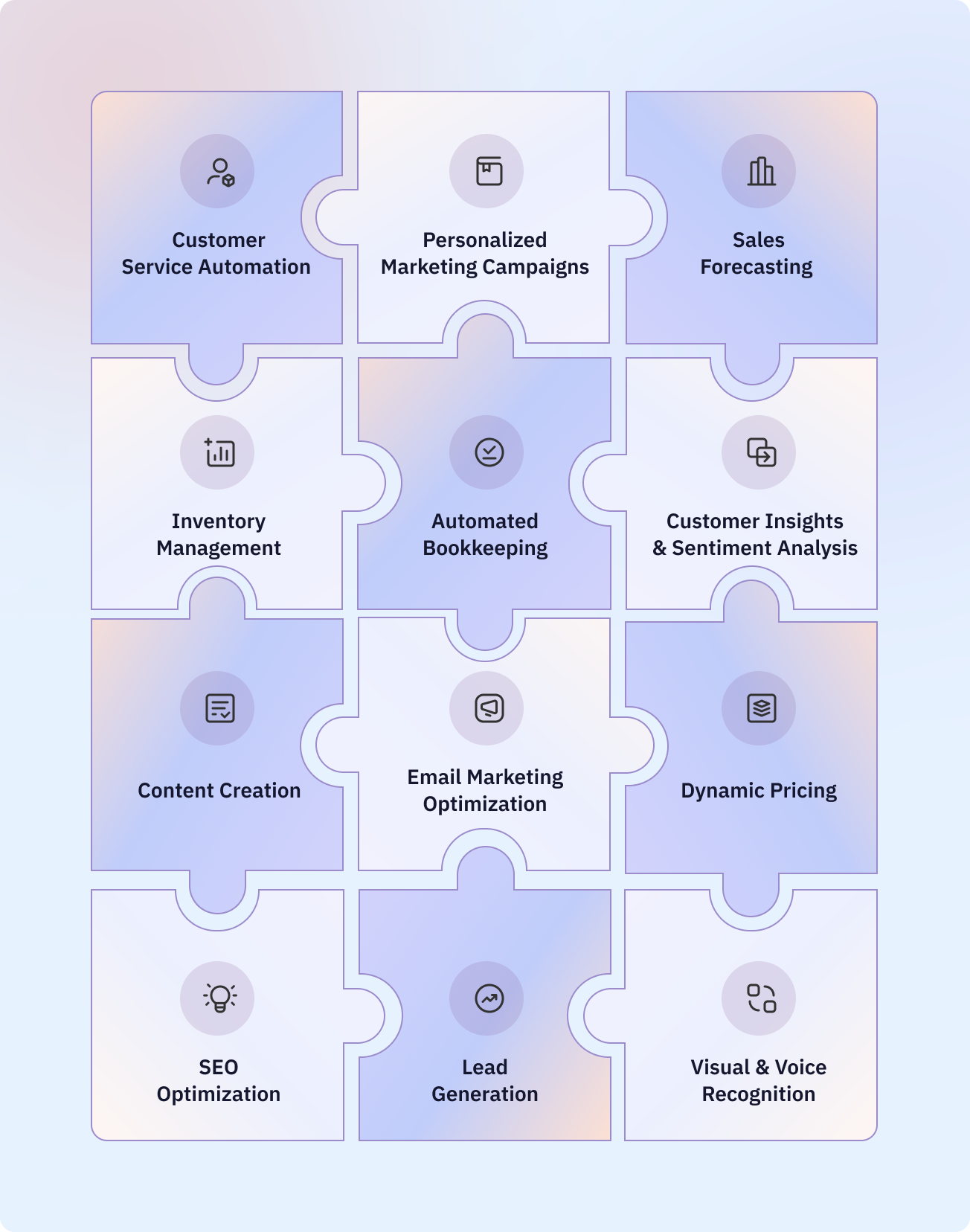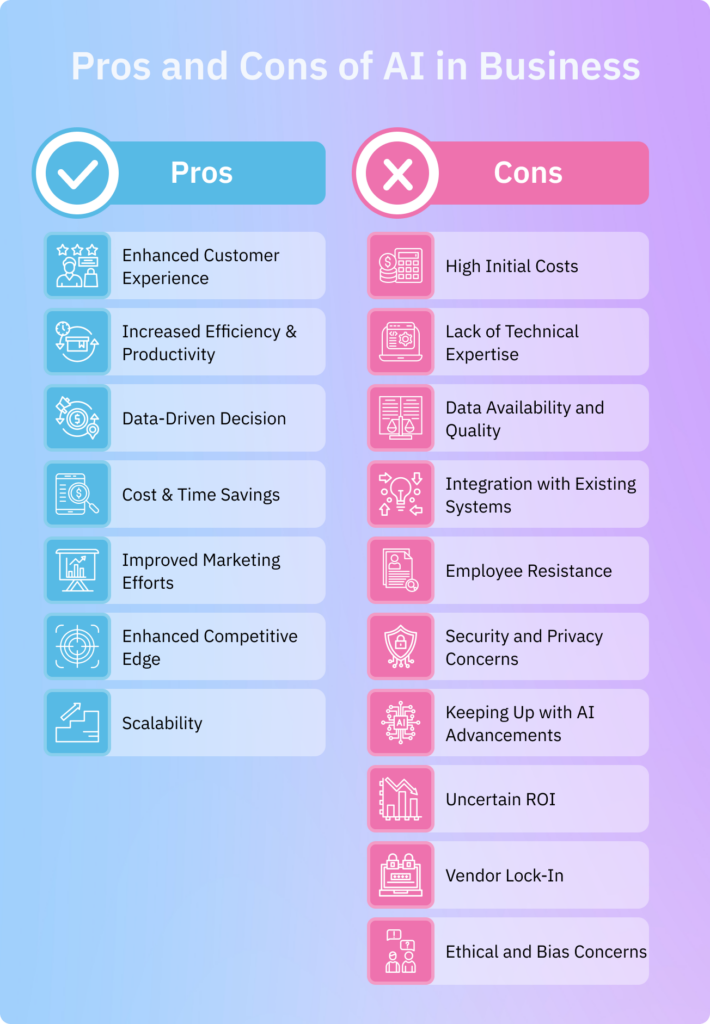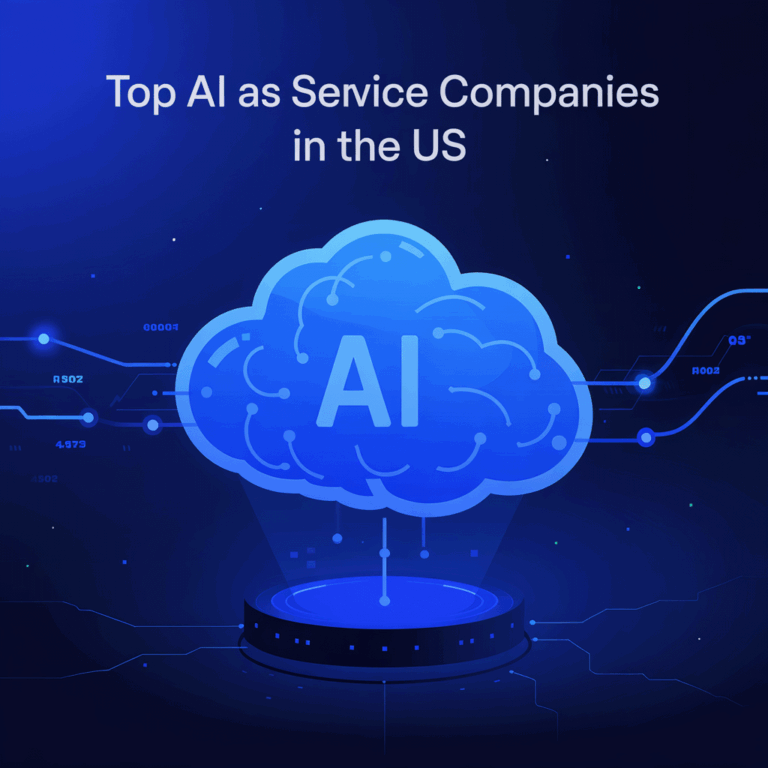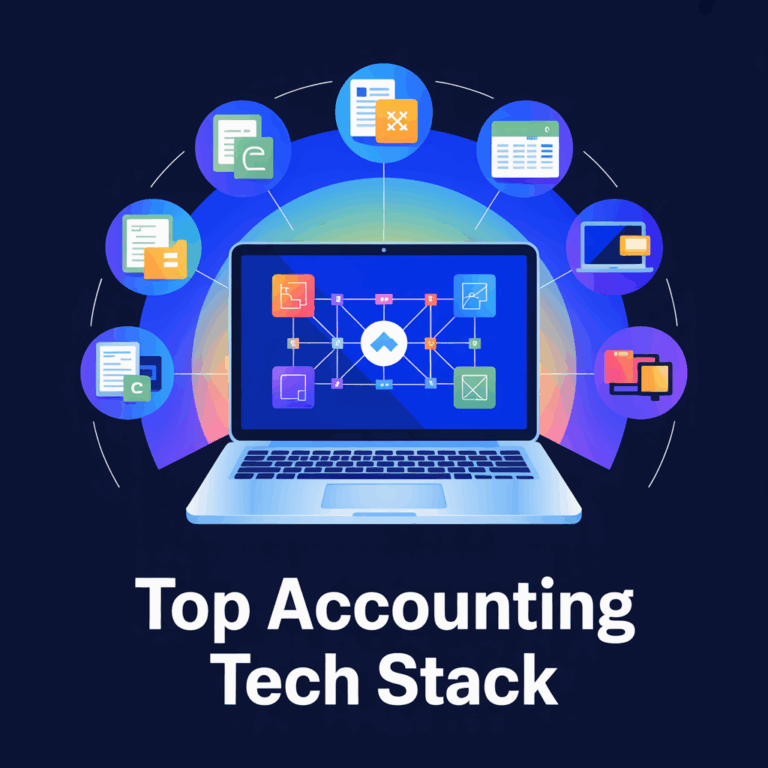Thanks to the democratization of artificial intelligence, small businesses are now on the same playing field as large corporations. AI for small businesses is simplifying their operations and making advanced tools and solutions affordable and accessible. By streamlining tasks, enhancing customer relationships, and driving innovation, AI is empowering small businesses to compete and succeed.
For small business owners, embracing AI can feel daunting. You might wonder: “Is it really for me?” The answer is yes! In recent years, AI has become more accessible and affordable, allowing businesses of all sizes to take advantage of its benefits. According to a recent study by SBEC, 48% of small businesses have started using AI in the past year, and 29% have been using it for one or two years.
In this article, we’ll explore how AI can help your small business thrive, from specific use cases and AI Tools for Business to challenges and future trends. Whether you’re looking to optimize customer service or streamline your operations, AI can unlock new possibilities for growth and efficiency.
I. Overview of AI in Business
From manufacturing to marketing, AI’s impact spans industries, enhances operational efficiency, and drives business innovation. Modern AI applications include Generative AI for Business, which creates new content such as text, images, and even videos. This helps employees look for more creative ideas and means to accelerate their creative and marketing processes.
Natural Language Processing (NLP) enables businesses to understand and generate human language, improving customer interactions through advanced chatbots, AI agents for business, and virtual assistants. Machine Learning (ML) models now offer more sophisticated predictive analytics, thus allowing companies to forecast trends and optimize strategies with unprecedented accuracy. Computer Vision technologies are transforming industries by automating image and video analysis, from quality control in manufacturing to advanced security systems.
As these technologies advance, they provide businesses with powerful tools to automate tasks, personalize customer experiences, and make data-driven decisions. In this way, AI keeps companies competitive in a rapidly evolving market.
Here are some compelling statistics to better understand the role of AI in business. A 2023 survey conducted by InstantPrint among 1,000 UK office workers revealed some compelling insights about AI adoption in the workplace. The survey found that:
- 89% of respondents are already using AI in their jobs.
- Of those, 71% are between 18 and 34 years old.
- 24% said AI helps them save money, while 21% noted it saves them time.
As for how AI is being used, workers are leveraging it for a variety of tasks:
- 25% for planning and 25% for writing copy
- 19% for transcribing
- 17% rely on AI as a virtual assistant and for research
- 15% use it for image generation
- 13% turn to AI for personalized shopping experiences and administrative tasks
- 12% for learning and 11% for navigation
II. 15 Ways of How to Use AI in Your Small Business
AI is now within reach of small businesses, not just a privilege of large enterprises. With AI solutions, you can automate tasks, cut costs, and delight customers. Here are 15 strategies to harness AI in small businesses and stay ahead of the competition.

1. Customer Service Automation
AI-powered chatbots like Tidio, LivePerson, or ChatGPT can handle a large volume of customer inquiries at all hours, ensuring your customers receive immediate responses even outside business hours. These bots can answer FAQs, resolve simple issues, and even complete transactions, freeing up your human customer service agents to focus on more complex tasks. According to IBM studies, 80% of routine customer inquiries can be handled by AI chatbots, reducing operational costs significantly.
2. Personalized Marketing
Campaigns Personalization is key to modern marketing success. AI Marketing Analytics tools like HubSpot and ActiveCampaign use customer data to create highly tailored marketing campaigns.
By leveraging AI in Ecommerce, small businesses can not only streamline their operations but also enhance the customer experience with AI-powered product recommendations, automated customer support, and tailored marketing strategies that drive higher engagement and conversions.
AI analyzes customer behavior, purchase history, and engagement patterns to send personalized messages, offers, and product recommendations. This level of precision can drive a 20% increase in revenue, as consumers are more likely to engage with messages that speak directly to their preferences and needs.
3. Sales Forecasting
Businesses face a critical challenge: predicting future sales. Enter AI-powered CRM systems like Salesforce and Zoho. These tools analyze historical data, seasonality, and market conditions to forecast sales performance. The solution? Up to 50% improved accuracy in predictions. Benefits abound: better inventory management, efficient resource allocation, and anticipation of customer demand. By leveraging AI for demand forecasting, companies avoid overproduction and stock shortages. This leads to smarter business planning and optimized operations for an uncertain future.
4. Inventory Management
AI in supply chain and logistics, for example, AI-powered chatbots like Tidio, LivePerson, or ChatGPT can handle a large volume of customer inquiries at all hours, ensuring your customers receive immediate responses even outside business hours. These bots can answer FAQs, resolve simple issues, and even complete transactions, freeing up your human customer service agents to focus on more complex tasks. According to IBM studies, 80% of routine customer inquiries can be handled by AI chatbots, reducing operational costs significantly.
5. Automated Bookkeeping
Managing finances is one of the most time-consuming tasks for small business owners. AI-driven accounting platforms like QuickBooks and Xero automate mundane tasks such as invoicing, expense tracking, and payroll. They can also categorize expenses, reconcile accounts, and generate financial reports. AI can even detect anomalies and flag potential errors or fraud. By automating these processes, small businesses can save up to 341,000 hours annually on financial management.
6. Customer Insights and Sentiment Analysis
Understanding how customers feel about your brand may open your eyes to many things, drastically boosting your brand. AI tools like MonkeyLearn and Lexalytics allow businesses to analyze customer feedback from reviews, social media, and surveys. Sentiment analysis uses natural language processing (NLP) to gauge whether feedback is positive, negative, or neutral. This real-time feedback helps businesses quickly address issues and make data-driven decisions to enhance customer satisfaction, leading to improved brand loyalty and retention rates.
7. Content Creation
AI tools like Copy.ai and Jasper offer a way to create marketing copy, blog articles, social media posts, and product descriptions. Just enter a prompt, and these platforms can generate relevant, high-quality content in seconds. While they won’t completely take the place of human writers, they can significantly cut down the time needed for content creation. This helps small businesses maintain a steady content schedule without putting too much pressure on their teams.
8. Email Marketing Optimization
Mailchimp and Brevo (formerly Sendinblue) enhance email marketing by examining key metrics like open rates, click-through rates, and user behavior. These AI tools determine the best times to send messages, create engaging subject lines, and customize content for each recipient, thus boosting campaign performance. With AI-driven email optimization, businesses can see a 30% rise in their marketing ROI.
9. Dynamic Pricing
Small businesses thrive on smart pricing, especially when rivalry heats up. Enter AI-powered tools like Pricemoov and Quicklizard. These whiz-kids use machine learning to tweak prices on the fly. They watch demand, peek at competitors, and track stock levels. As a result, businesses stay nimble and maximize profits without losing their edge. When demand soars, they capture extra margin. When shelves need clearing, discounts appear. This digital dance can boost revenue by 10-20% while keeping small players in step with market rhythms.
10. Employee Training and Development
From skills assessment to productivity gains, AI for small businesses reshapes employee training. Platforms like EdApp and Coursera for Business analyze individual competencies and tailor programs accordingly. AI adjusts their learning paths as employees progress, ensuring relevance to business needs. This personalized approach yields tangible results.
11. Fraud Detection
AI in small businesses is highly effective at detecting fraudulent activities, especially for businesses that handle online payments. Tools like Sift and Kount use machine learning to analyze transaction data in real time, identifying unusual patterns that may indicate fraud. These systems can flag suspicious activity automatically, thus helping to prevent chargebacks, account takeovers, and other types of fraud. AI fraud detection systems can reduce fraud-related transactions by as much as 40%.
12. Virtual Assistants for Admin Tasks
AI virtual assistants like Siri, Google Assistant, and Microsoft Cortana handle routine administrative tasks such as scheduling meetings, setting reminders, and sending follow-up emails. For small business owners juggling various roles, these assistants can free up hours each week by automating mundane but necessary tasks. This leads to better time management and lets owners concentrate on more strategic goals.
13. SEO Optimization
Ranking higher on search engines can be the difference between being found by new customers and being overlooked. AI tools like Frase and Surfer SEO help small businesses optimize their content for search engines. These tools analyze search intent, suggest relevant keywords, and provide recommendations to improve page rankings. Businesses using AI to optimize their SEO can see an increase in organic traffic by 14% over time, leading to more leads and sales. Explore how Alibaba, Amazon, and other companies use AI other than for SEO purposes.
14. Lead Generation
Chatbots and automated messaging, powered by AI tools like Intercom and Drift, revolutionize customer engagement. These virtual assistants tirelessly interact with website visitors, qualifying leads and scheduling appointments. By analyzing user behavior, they pinpoint hot prospects and initiate tailored follow-ups. This AI-driven approach not only streamlines lead generation but also boosts conversion rates by up to 30%. Your sales team can focus on closing deals while AI captures more business opportunities, maximizing efficiency without sacrificing personal touch.
15. Visual and Voice Recognition
AI technologies like Amazon Rekognition and Google Cloud Vision enable small businesses to automate tasks such as scanning product images, verifying identities, or recognizing objects in photos. Voice recognition software can also be used to provide hands-free command capabilities for devices or customer-facing applications, improving user experience. Retail, security, and customer service businesses are increasingly using these tools to streamline processes and reduce manual effort.
AI revolutionizes small businesses in 15 key areas, slashing operational costs, supercharging efficiency, and unveiling fresh growth opportunities. Though AI seems daunting, its impact is profound. Begin with small, targeted implementations, and focus on tools addressing your unique needs. This strategy yields quick wins and lasting benefits. Start small, think big, and watch your company thrive in both the short and long term. By the way, you can get an approximate estimate for your future AI project with our online cost calculator.
III. Best AI Tools for Small Businesses: The Detailed Table
This table includes a range of tools across various business functions that help small businesses streamline operations and optimize efficiency.
| AI Tool | Category | Primary Function |
|---|---|---|
| ChatGPT | Customer Service, Chatbots | Automates customer support with conversational AI. |
| HubSpot | Marketing Automation | Creates personalized marketing campaigns and automates CRM processes. |
| QuickBooks | Financial Management | Automates bookkeeping, invoicing, and financial reporting. |
| Mailchimp | Email Marketing | Optimizes email marketing campaigns with personalized content and automated sending. |
| Zoho CRM | Sales Forecasting | An AI-driven CRM system for managing customer relationships and predicting sales trends. |
| Jasper | Content Creation | An AI-powered platform that generates marketing copy, blog posts, and social media content. |
| MonkeyLearn | Sentiment Analysis | Analyzes customer feedback and reviews using NLP to gauge customer sentiment. |
| Xero | Accounting | An AI-powered accounting tool for managing finances, invoicing, and expense tracking. |
| Frase | SEO Optimization | An AI platform for optimizing website content and improving SEO rankings. |
| Drift | Lead Generation | AI-driven chatbot that engages website visitors and helps qualify leads for sales teams. |
| Salesforce | Sales Forecasting | Advanced AI-driven CRM for tracking customer interactions and predicting future sales. |
| HireVue | Recruitment | An AI tool for automating and optimizing the recruitment process, including candidate screening. |
| Pricemoov | Dynamic Pricing | An AI-based dynamic pricing tool that adjusts prices in real time based on demand and competitor data. |
| Sift | Fraud Detection | Uses AI to detect fraudulent transactions and prevent payment fraud. |
| Tidio | Customer Support Chatbots | Provides live chat and chatbot solutions for customer service automation. |
| ClickUp | Project Management | An AI-powered project management tool that automates task tracking, scheduling, and workflows. |
| ChatSpot by HubSpot | AI-Driven CRM & Sales Assistant | An AI tool for automating CRM tasks, data entry, and sales insights within the HubSpot ecosystem. |
| DALL-E 2 | Image Generation | An AI platform for creating unique images based on text descriptions, ideal for marketing and design. |
IV. How AI Can Help Small Businesses: Notable Benefits
Artificial Intelligence offers a wealth of benefits for small businesses. It enhances operational efficiency, customer experiences, and overall growth. Drawing insights from recent discussions on AI’s impact, here’s a look at how integrating AI can benefit your small business.
1. Enhanced Customer Experience
Virtual assistants and AI-powered chatbots make customer support a totally different experience. These tools offer 24/7 personalized service, swiftly addressing inquiries and resolving issues. Small businesses reap the benefits — faster responses, efficient problem-solving, and tailored experiences. As a result, they get heightened customer satisfaction and lasting loyalty.
According to a Forbes study, most people—69% to be exact—say quick responses are the key to great customer service. Another 62% think effective problem resolution is vital. Given these priorities, it’s clear that AI for customer experience in small businesses can play a crucial role in optimizing response speeds and ensuring 24/7 availability across all channels. By embracing AI, companies transform their customer interactions, fostering stronger relationships and driving long-term success.
2. Increased Efficiency and Productivity
Routine tasks vanish as AI takes charge. Data entry, scheduling, and invoicing are all automated. Employees breathe easier, turning their focus to strategy and growth — no more administrative drudgery. Instead, staff dive into business-boosting activities. Small companies embrace the change, reaping rewards. AI-powered automation propels productivity skyward, with gains of up to 66%. In this new landscape, human potential flourishes, unburdened by mundane chores.
3. Data-Driven Decision
AI tools analyze large volumes of data to provide actionable insights and predictions. This data-driven approach helps businesses make more informed decisions, whether it’s about customer preferences, market trends, or financial forecasting. By leveraging AI in small businesses for data analysis, small businesses can uncover trends and make strategic decisions that were previously beyond their reach. Forbes notes that businesses using AI for analytics have achieved a 44% improvement in decision-making accuracy.
4. Cost and Time Savings
AI slashes costs for businesses, automating tasks and boosting efficiency. It trims labor expenses and errors with tools like AI-powered financial management. McKinsey reports small firms can cut operational costs by 30%. An SBEC survey shows AI’s impact: significant time and money saved, which allows strategic resource allocation.
For example, AI in Logistics can significantly enhance supply chain operations by optimizing delivery routes, automating inventory management, and predicting demand, thus driving overall efficiency and cost savings.
From accounting to operations, AI empowers small businesses to work smarter, not harder, freeing up funds for growth and innovation. Let’s peek at the most critical statistics:
- 37% have reinvested AI-related cost savings into adopting other new technologies;
- 36% have managed to keep prices stable for customers, even amidst inflationary pressures;
- 34% have redirected savings toward pursuing growth opportunities for their business;
- 25% have used the financial benefits from AI to increase wages and employee benefits.
- 25% have set aside capital from AI-related savings for emergency funds or other purposes.
- 20% have accelerated debt repayment by applying the cost savings generated from AI adoption.
This data underscores how AI is helping small businesses improve efficiency and make strategic financial decisions.
5. Improved Marketing Efforts
Small businesses see a boost in campaign effectiveness with AI marketing. Personalized strategies emerge from analyzing customer behavior, and AI tools enable targeted advertising and precise audience segmentation. This leads to higher engagement rates and increased conversions. In turn, marketing campaigns are optimized through AI algorithms. As customer connections transform in the digital age, AI enhances strategies, providing powerful tools for modern marketers.
6. Enhanced Competitive Edge
Adopting AI allows small businesses to stay competitive in a rapidly evolving market. AI enables businesses to innovate and respond to market changes more quickly, offering solutions and features that differentiate them from competitors. Forbes emphasizes that AI adoption can give small businesses a significant competitive advantage, allowing them to compete effectively with larger enterprises.
7. Scalability
As your enterprise grows, AI adapts seamlessly. These systems effortlessly manage surging data, customer engagement, and operational needs, eliminating the need for matching resource hikes. AI’s role in efficient scaling is immense as it maintains quality while supporting expansion. It’s the smart way to grow without compromise.
Efficiency skyrockets as artificial intelligence streamlines operations. Customer satisfaction soars with personalized, AI-driven interactions. Profitability climbs as data-driven insights reveal new opportunities. Innovation flourishes, propelling companies forward. Small enterprises harness AI’s transformative power, gaining a competitive edge. This technological leap ensures long-term success in today’s dynamic marketplace. By embracing AI, small businesses unlock their full potential and secure a thriving future.
Learn about AI Tech Stack and the benefits of integrating it into business processes in our article.
V. Top Techniques for Adopting AI Solutions for Small Businesses
Adopting AI in small businesses can seem overwhelming, but with the right strategies, you can successfully integrate AI to improve efficiency, enhance customer experiences, and streamline operations. Below are key techniques that small businesses can use to implement AI solutions effectively:
1. Start Small and Scale Gradually
It’s important for small businesses to start with small AI initiatives before fully committing to more complex solutions. Begin by adopting AI for specific tasks, such as automating customer service with chatbots or using AI to optimize marketing campaigns. As you become more familiar with AI technology, gradually scale up to more advanced applications like AI-powered data analysis or inventory management. This approach minimizes risks and allows time to evaluate the results before further investment.
2. Identify Business Pain Points
Before implementing any AI tool, it’s critical to pinpoint the specific business challenges you’re aiming to solve. Is it streamlining administrative tasks, improving customer support, or enhancing marketing efforts? Understanding the key areas that require improvement will help you select the right AI solutions for small businesses to address those pain points. For instance, a chatbot may be the ideal first step if customer response time is a major issue.
3. Choose the Right AI Tools
Numerous AI tools are available, each designed for different aspects of business operations. It’s essential to choose the right tools that align with your business needs. For example, if you need help managing projects and automating workflows, tools like ClickUp are perfect. If content creation or image generation is your focus, Jasper or DALL-E 2 can provide significant value. Be sure to evaluate the functionalities of different AI tools and how they integrate with your existing systems before making a selection.
4. Focus on Data Quality
AI is highly dependent on data. The better the data, the more accurate and useful the AI insights. Small businesses must ensure their data is clean, well-organized, and regularly updated. Focus on collecting data from relevant sources and using tools that help you maintain data quality. For instance, using AI for customer relationship management (CRM) with tools like Zoho CRM or HubSpot allows you to track customer interactions and preferences, giving you valuable insights for improving your marketing strategies.
5. Train Your Team
To successfully adopt AI for a small business, your team must understand how to use the tools. Offer training sessions to ensure employees are comfortable with the technology and know how to maximize its potential. Many AI tools come with built-in training resources, while others may require third-party guidance. AI should enhance your team’s productivity, not replace them, so helping them integrate AI into their daily workflow is crucial.
6. Leverage Cloud-Based AI Solutions
Cloud-based AI platforms offer a cost-effective way for small businesses to adopt AI without the need for significant upfront investment in hardware. Many AI tools, such as QuickBooks for financial management or Frase for SEO optimization, are cloud-based, offering flexibility and scalability. This makes it easier for businesses to access advanced AI technologies without a hefty price tag while ensuring that solutions are always up to date.
7. Monitor and Optimize Performance
Once you’ve adopted AI tools, it’s essential to continually monitor their performance. Use metrics to evaluate the effectiveness of the AI solutions and how they contribute to business goals, such as reduced operational costs or improved customer satisfaction. Based on this data, adjustments should be made to optimize the use of AI software for small businesses. For example, if you’re using AI for marketing automation, monitor key performance indicators (KPIs) like open rates, click-through rates, and conversions to assess success and make necessary tweaks.
8. Partner with AI Experts
While many AI tools are designed to be user-friendly, working with AI consultants or experts can be beneficial, especially when implementing more advanced systems. Experts like LITSLINK can guide you through the adoption process, recommend the best tools for your business needs, and help ensure your AI systems are properly integrated and optimized. Hiring experts can reduce the learning curve and improve the overall success of your AI adoption strategy. LITSLINK has years of experience, a vast portfolio of AI projects, and knowledge of multiple technologies and tools, so teaming up with us would be your best investment.
9. Ensure Data Security
As AI relies heavily on data, it’s essential to prioritize data security. Small businesses should implement strong cybersecurity measures to protect sensitive data from breaches, especially when using AI tools for customer service, financial management, or marketing. Work with AI providers that offer robust security protocols and regularly audit your systems to ensure compliance with data protection standards. We have a guide that will equip you with the knowledge and tools to prevent cyberattacks and ensure a safer digital experience. Get more insights there!
10. Keep Up with AI Trends
AI technology is evolving rapidly. Small businesses should stay informed about the latest AI trends and advancements to stay competitive. Subscribe to industry newsletters, attend AI-related webinars, and network with AI professionals to learn about new tools or features that can benefit your business. Keeping up to date will help you adopt new AI solutions more effectively and maintain a competitive edge.
By following these techniques, small businesses can successfully integrate AI solutions into their operations, resulting in greater efficiency, improved customer experiences, and long-term growth.
VI. Challenges for Using AI Tools in Small Businesses
While AI offers significant benefits, small businesses often face challenges when integrating AI tools into their operations. Understanding these obstacles can help businesses develop strategies to overcome them and maximize the potential of AI. Here are some of the key challenges:

1. High Initial Costs
Many AI tools come with upfront costs that may be challenging for small businesses with limited budgets. Although AI can generate long-term cost savings, the initial investment in software, hardware, and training can be daunting. For businesses on tight margins, these expenses can be a significant barrier to entry, especially if they are uncertain about the return on investment (ROI).
2. Lack of Technical Expertise
Even for small businesses, AI requires a level of technical understanding that many may not possess in-house. Unlike larger companies with dedicated IT departments, small businesses often lack the technical expertise to implement and manage AI systems. This lack of knowledge can slow down the adoption process, making it difficult to integrate AI tools effectively. Moreover, the complexity of some AI solutions may lead to improper usage or underutilization.
3. Data Availability and Quality
AI systems are data-driven, and their effectiveness largely depends on the quality and quantity of data they receive. Small businesses may struggle with limited access to large datasets, which can hinder the performance of AI tools. Additionally, poor data management practices, such as incomplete or outdated records, can compromise the accuracy of AI-generated insights, reducing the overall value AI can bring to the business.
4. Integration with Existing Systems
Many small businesses operate on legacy systems that may not be fully compatible with modern AI solutions. Integrating new AI tools into these outdated systems can be a complex and costly process. This challenge is particularly relevant for businesses that have not yet digitized their operations. The need to overhaul existing infrastructure can lead to additional expenses and downtime, further complicating the adoption of AI.
5. Employee Resistance
AI can sometimes be perceived as a threat to jobs, leading to resistance from employees who fear being replaced by automation. This can create a negative work environment and hinder the successful adoption of AI. To overcome this challenge, businesses need to emphasize the role of AI in augmenting, not replacing, human workers. Offering training and ensuring that AI tools are used to enhance productivity can help alleviate employee concerns.
6. Security and Privacy Concerns
As AI systems process large amounts of sensitive data, small businesses must prioritize cybersecurity. However, many small firms lack the resources to implement robust data security
measures, leaving them vulnerable to data breaches and cyberattacks. Additionally, privacy concerns around customer data can create legal and ethical issues, especially if AI tools are not compliant with data protection regulations like GDPR or CCPA.
7. Keeping Up with AI Advancements
AI technology evolves rapidly, and keeping up with the latest developments can be a challenge for small businesses with limited time and resources. Staying informed about the latest tools, updates, and best practices requires continuous learning and adaptation. This can be difficult for small business owners focused on day-to-day operations, leading to the risk of falling behind competitors who adopt newer AI innovations.
8. Uncertain ROI
While AI can improve efficiency and generate cost savings, the ROI is not always immediate or guaranteed. Small businesses may be hesitant to invest in AI if they are unsure of the tangible benefits. Additionally, measuring the success of AI implementation can be difficult, especially in the early stages when the impact on productivity and profits may not be apparent. This uncertainty can make decision-makers cautious about committing to AI investments.
9. Vendor Lock-In
Many AI tools are offered by third-party vendors, and businesses may become dependent on a specific vendor’s platform or services. This creates the risk of vendor lock-in, where switching to a different AI provider becomes costly and complicated. Small businesses that lack the resources to negotiate favorable contracts or explore multiple solutions may find themselves tied to one provider, limiting their flexibility to adapt to new technology.
10. Ethical and Bias Concerns
AI systems can inadvertently perpetuate biases if they are trained on biased data. This can create ethical challenges for small businesses, especially when AI tools are used in customer interactions, hiring processes, or decision-making. Ensuring that AI algorithms are fair and free from bias requires careful data handling and regular audits, which can be resource-intensive for small firms.
VII. Future Trends of AI for Small Businesses
As we approach the end of 2024, AI is becoming even more essential for small businesses, offering tools and insights previously available only to larger companies. Here are key trends to watch:
AI-Driven Personalization
AI will continue to enhance personalized customer experiences. Small businesses can use AI to deliver customized marketing, product recommendations, and customer support, increasing
engagement and loyalty.
Affordable AI Solutions
AI is now more accessible and affordable, specifically tailored for small and mid-sized businesses. Simple, user-friendly tools are making it easier for non-technical teams to integrate AI into everyday operations, such as automating marketing and improving customer service.
Advanced Automation
AI will further automate complex tasks like sales forecasting, inventory management, and customer interactions. This will help small businesses save time, reduce costs, and focus on high-priority tasks.
Predictive Analytics
AI’s ability to analyze data and predict trends will become more refined. Small businesses can use these insights to make data-driven decisions, optimize inventory, and enhance financial planning.
AI-Enhanced Cybersecurity
AI will play a crucial role in protecting small businesses from growing cybersecurity threats, using real-time monitoring and advanced threat detection to prevent attacks.
AI for Remote Work
As remote and hybrid work models continue, AI tools will help small businesses manage teams more effectively, streamlining workflows and boosting productivity.
To Sum Up
AI is rapidly transforming how small businesses operate, offering tools and solutions that were once out of reach for many. As technology becomes more accessible, small businesses can leverage AI to streamline processes, improve customer experiences, and stay competitive in a fast-evolving marketplace.
Key Takeaways:
AI Software for Small Business:
From automation to customer service, AI is offering practical solutions for day-to-day operations.
15 Ways to Use AI in Your Business:
Whether automating tasks, enhancing marketing, or improving decision-making, AI provides versatile applications across various areas.
Best AI Tools for Small Businesses:
Tools like ClickUp, ChatSpot by HubSpot, and DALL-E 2 are already helping small businesses boost productivity and creativity.
Benefits of AI Adoption:
By adopting AI, Small businesses are seeing time and cost savings, improved efficiency, and enhanced customer engagement.
Techniques for Implementing AI:
Starting small, focusing on data quality, and choosing the right tools are crucial steps for preparing AI for business.
Challenges of AI for SMBs:
Limited budgets, a lack of expertise, and data privacy concerns remain obstacles for small firms.
Future Trends in AI:
Personalization, automation, and predictive analytics will continue to shape the future of small business operations as AI technology advances.
By embracing AI, small businesses can unlock new opportunities for growth and innovation, staying competitive in an increasingly tech-driven world. The key is to start small, choose the right tools, and evolve alongside the technology to get the most out of AI.







